 June 2024 in “JEADV Clinical Practice”
June 2024 in “JEADV Clinical Practice” Severe alopecia areata patients have a low chance of spontaneous hair regrowth.
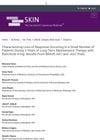 January 2025 in “SKIN The Journal of Cutaneous Medicine”
January 2025 in “SKIN The Journal of Cutaneous Medicine” Some patients on Baricitinib for alopecia areata lost response, often linked to longer and more severe initial conditions.
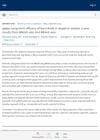 September 2024 in “Journal of the American Academy of Dermatology”
September 2024 in “Journal of the American Academy of Dermatology” Baricitinib maintains significant hair regrowth in severe alopecia areata over three years.
 1 citations,
September 2023 in “Journal of the American Academy of Dermatology”
1 citations,
September 2023 in “Journal of the American Academy of Dermatology” Baricitinib significantly improves hair regrowth in severe alopecia areata.
 September 2023 in “British Journal of Dermatology”
September 2023 in “British Journal of Dermatology” Hair regrowth from severe alopecia areata treatment with baricitinib can vary, with faster results in those with shorter hair loss duration.
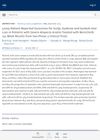 September 2024 in “Journal of the American Academy of Dermatology”
September 2024 in “Journal of the American Academy of Dermatology” Baricitinib helps long-term hair regrowth in severe alopecia areata patients.
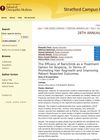
Baricitinib effectively promotes hair regrowth in severe alopecia with minimal side effects.
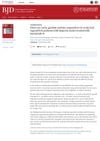 November 2023 in “British Journal of Dermatology”
November 2023 in “British Journal of Dermatology” Different people with severe hair loss respond to baricitinib treatment at different times, with some showing improvement early, some gradually, and others later.
 1 citations,
February 2024 in “JEADV. Journal of the European Academy of Dermatology and Venereology/Journal of the European Academy of Dermatology and Venereology”
1 citations,
February 2024 in “JEADV. Journal of the European Academy of Dermatology and Venereology/Journal of the European Academy of Dermatology and Venereology” Baricitinib effectively promotes long-term hair regrowth in alopecia areata patients.
 November 2023 in “Dermatology and Therapy”
November 2023 in “Dermatology and Therapy” Baricitinib treatment helps regrow eyebrow, eyelash, and scalp hair in severe alopecia areata, improving patients' emotional well-being and quality of life.
 1 citations,
August 2023 in “JAMA Dermatology”
1 citations,
August 2023 in “JAMA Dermatology” Increasing the dose of baricitinib to 4 mg helps more patients with severe alopecia areata regrow hair.
 1 citations,
January 2023 in “Cutis”
1 citations,
January 2023 in “Cutis” The paper concludes that the new medication baricitinib needs further testing in a more diverse group of patients with alopecia areata.
 April 2024 in “Frontiers in pharmacology”
April 2024 in “Frontiers in pharmacology” Brepocitinib 30mg is most effective for moderate-to-severe alopecia areata, but ritlecitinib 50mg may offer a better balance of safety and effectiveness.
 12 citations,
June 2023 in “JAMA network open”
12 citations,
June 2023 in “JAMA network open” JAK inhibitors effectively improve hair regrowth in alopecia areata with an acceptable safety profile.
 40 citations,
August 2022 in “Frontiers in immunology”
40 citations,
August 2022 in “Frontiers in immunology” Blocking JAK/STAT pathways can help treat hair loss from alopecia areata.
1 citations,
December 2023 in “Molecules/Molecules online/Molecules annual” JAK inhibitors show promise for treating various skin diseases.
 December 2023 in “Journal of dermatology”
December 2023 in “Journal of dermatology” Adults and adolescents with severe alopecia areata are willing to take significant health risks for a better chance of hair regrowth.
 September 2022 in “Plastic and Reconstructive Surgery”
September 2022 in “Plastic and Reconstructive Surgery” Baricitinib helps with severe hair loss, negative-pressure therapy lowers hernia recurrence, tranexamic acid reduces bleeding, robot-assisted breast surgery may improve outcomes, and acellular dermal matrix could decrease breast reconstruction complications.
 May 2023 in “Journal of managed care & specialty pharmacy”
May 2023 in “Journal of managed care & specialty pharmacy” Alopecia areata causes hair loss and life quality issues; current treatments are often unsatisfactory, but new drugs like JAK inhibitors show promise.
 1 citations,
March 2023 in “Clinical, Cosmetic and Investigational Dermatology”
1 citations,
March 2023 in “Clinical, Cosmetic and Investigational Dermatology” Current treatments for Alopecia Areata have mixed success, and there's a need for better, more accessible options and support for affected individuals.
 October 2024 in “Scientific Reports”
October 2024 in “Scientific Reports” OXTR agonists may promote hair growth and be effective for treating hair loss.
 June 2023 in “British Journal of Dermatology”
June 2023 in “British Journal of Dermatology” Baricitinib was effective and safe for severe hair loss treatment over 6 months.
 25 citations,
November 2022 in “British journal of dermatology/British journal of dermatology, Supplement”
25 citations,
November 2022 in “British journal of dermatology/British journal of dermatology, Supplement” Baricitinib for severe alopecia areata is generally safe, with common side effects like infections and acne, and low rates of serious complications.
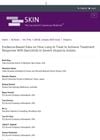 January 2025 in “SKIN The Journal of Cutaneous Medicine”
January 2025 in “SKIN The Journal of Cutaneous Medicine” Baricitinib treatment for severe alopecia areata shows significant improvement by 52 weeks, especially in very severe cases.
 June 2024 in “Dermatology and Therapy”
June 2024 in “Dermatology and Therapy” Baricitinib improves quality of life and reduces anxiety and depression in severe alopecia areata patients with hair regrowth.
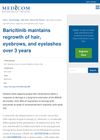
Baricitinib helps keep hair, eyebrows, and eyelashes regrown for 3 years in most people with severe hair loss.
 3 citations,
May 2023 in “Clinical drug investigation”
3 citations,
May 2023 in “Clinical drug investigation” JAK inhibitors for alopecia areata are linked to minor side effects like headache and acne, but not to an increased risk of serious adverse events.
 January 2025 in “Skin Health and Disease”
January 2025 in “Skin Health and Disease” Baricitinib may effectively treat both alopecia areata and immune thrombocytopenia.

Reducing the dose of Baricitinib to 2mg still helped over half of the patients with severe scalp alopecia maintain their hair regrowth after two years.
 6 citations,
May 2023 in “Drugs”
6 citations,
May 2023 in “Drugs” Baricitinib helps regrow hair in adults with severe alopecia better than a placebo and is approved for treatment, but long-term effects are still unknown.





























